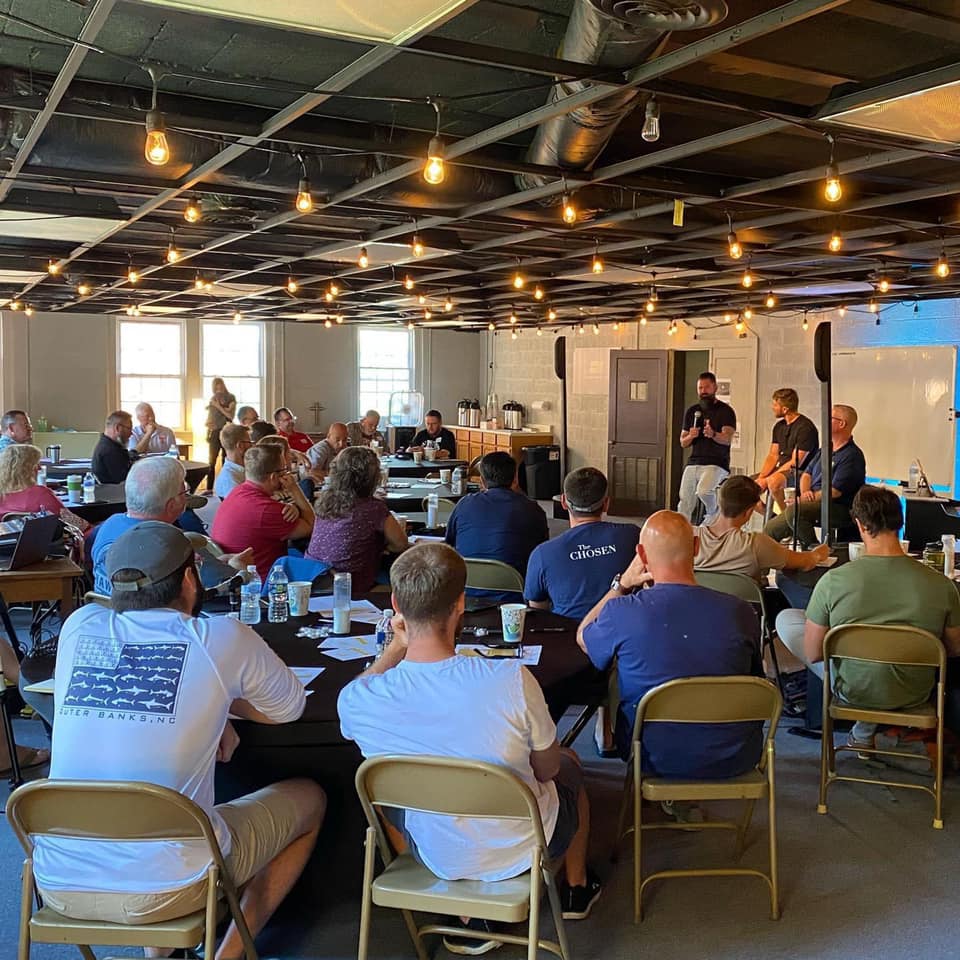
What is the key to sharing Jesus? Refreshment from the CREO South Intensive

What did Ivey and I experience at the CREO South Intensive?
On the last and greatest day of the festival, Jesus stood and said in a loud voice, “Let anyone who is thirsty come to me and drink. Whoever believes in me, as Scripture has said, rivers of living water will flow from within them.” John 7:37-38
If you were to ask me for a word describing our time in Knoxville Tn., then I would reply “refreshment.” That illustrates perfectly what God inspired this past weekend.
So let me give you a few details on how we arrived in South Knox in the middle of a hot Tennessee summer.
While on sabbatical, I received an invitation to attend a two-day event with a group called “The CREO Collective.”
Honestly, I didn’t want to go at first. But the Lord kept nudging me to give it consideration, and CREO did a good job of constantly inviting me, so I did what any ordinary guy does — I deferred to my wife (surely she wouldn’t want to go!). She would certainly want to go somewhere, anywhere other than to a church meeting.
What I thought Ivey would say was, “not another clergy meeting.” But to my surprise, she said, “sure, it looks like fun.”
“Rats!” I said to myself. “There goes that excuse.” Then I thought maybe the schedule wouldn’t quite work. After all, who was going to take the kids on such short notice? And what about the dogs? Did Ivey even have enough vacation time?
Enter grandparents, a job change, and friends.
As it turned out, the Lord perfectly orchestrated our schedule so we could go. He does that sometimes, even when my attitude isn’t quite where it needs to be.
As it turned out, it was the best decision I’ve made this year.
So what is CREO?
CREO is the Latin word for “create.” They are a group of church planters, missionaries, innovators, and pioneers for Jesus who are dedicated to exploring new expressions and forms of church, all for the sake of reaching people with the good news of Jesus.
The reason they do this is because of the distance that exists today between nonbelievers and established churches.
The leaders of CREO believe non-Christians are “still” interested in having spiritual conversations with Christians but are either uninterested or fearful of starting those conversations within the walls of the institutional church. Nonbelievers would rather have these kinds of conversations around a dinner table, fire pit, over drinks in a pub, or beside a pool.


If people do not trust your intentions, they will not open themselves up to anything you have to say.
That is nothing new. Missionaries have said this for decades.
Churches, unfortunately, have not always listened. And seminaries?? Well, let’s leave them alone.
The problem most of us face, including myself, is that we’ve never been trained on effectively having evangelistic conversations. So we resort to what we know or have been taught.
Let me give you two examples.
When I was a kid, I was trained to go knocking door to door inviting people to church. This method worked well for decades. Well, we’ve learned that today people will NOT open their doors to a stranger. BUT. They WILL open their doors to a familiar face, a neighbor, or even “a friend.”
Why won’t they open their doors? There are a variety of reasons. But usually, it comes down to one key issue: trust hasn’t been established.
The other example is crafting “worship experiences” so they are “attractive to unbelievers” so they will be more willing to go to church. But the end result of these attraction models most of the time is conversions from one form of church to another, I.e., sheep swapping.
If people do not trust your intentions, they will not open themselves up to anything you have to say.
Trust is the currency of relationships.
So, according to CREO, what is the key? Establishing trust between you and your non-believing friend. Skip this step, and you might as well knock on a thousand more doors or build the fanciest of cathedrals, all with the same results.
There are many steps to take before trust can be established, and that’s why so many of our churches are failing.
Here is a reality check. Most non-Christians do not “trust” Christians. We’re mean, judgmental, hateful, anti-intellectual, opinionated, and critical — at least that’s the outward public perception. We’re hostile to contrary political positions. We post hateful comments on our social media profiles. And sometimes, we do all of this under the guise of “free speech.”
Some or all of these may be true to some degree. But they were not true of the ministry of Jesus. In fact, in the life of Jesus, we see something scandalous for his time. He ate with tax collectors, sinners, and prostitutes while being very critical of the religious elite, particularly the clergy of his time. Interestingly enough, he gained the trust of those whom he came to reach.
We need to remember something. The way of Jesus is to love your neighbor as yourself. Trust is the cornerstone of love.
So ask yourself these questions.
Would you be willing to be vulnerable with someone whom you didn’t trust?
Would you take time to share your insecurities, hurts, pains, and even distrust of God when there was the risk of someone ready to pounce on your slightest doctrinal error?
Would you be willing to attend “their meeting” if you didn’t trust the organization that they belonged to?
I imagine not.
Jesus promised living water.
We sometimes forget the posture of many “seekers” who came to Jesus. They were scared, timid, and even frightened, but somehow they still came. What drew them into his presence? Perhaps it was his message. “Come to me all who are weary, and I will refresh you.” Or perhaps it was his promise, “If anyone is thirsty, let him come to me and drink. The one who believes in me…will have streams of living water flow deep within him.”
Think about these images for a moment. Jesus likened himself to a refreshing drink of water. Is that how people experience you?
The only way to overcome “distrust” is to move to neutral ground — conversations over coffee, dinner around your table, or lunch in your favorite place. And in those conversations, our task is to open up the fountain of Jesus and allow the healing waters of the spirit to be poured into our non-believing friends.
So ask yourself: do people come to you and experience refreshment, or do they find something else?
The leaders of CREO claim that people are indeed ready, eager, and even thirsty to have “spiritual conversations,” but they first insist we Christians must move towards them and not expect them to come to us.
What Ivey and I encountered in CREO was nothing new, exciting, or innovative. Rather, it was what Christianity has always been — generous love poured out to a desperately thirsty world. And that was refreshing to our thirsty souls.





Thank you for this great article distilling your experience at CREO and your desire to shared that experience with those who are thirsty and tired in the world. It’s so simple, but it fills a lifetime to love others in this way!
Thank you Jim for your thoughts here!
In the age of social media, everyone wants to be heard (like me now). 🙂 But in order to help the non-believer, we must learn to listen much more than we speak. Let THEM be heard. There is nothing that establishes trust more than simply giving someone your attention. If anyone needs to be heard right now, it’s the non-believer. Then, when they are ready to hear from us (and they will) God will speak through us.
Such great insight Paul. Thank you for sharing!